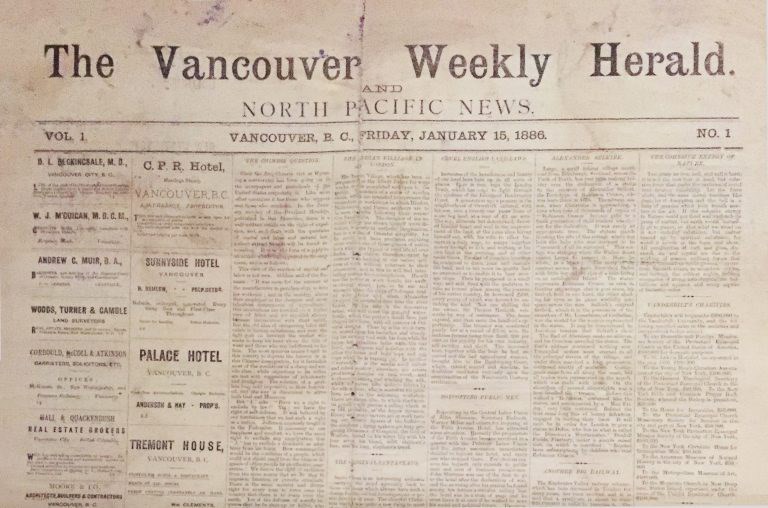Katherine Kalsbeek has never been more excited to get a newspaper delivered to her door.
On the morning of January 8, she received what is perhaps the only remaining copy of the first edition of Vancouver’s first newspaper.
“It’s so fun to learn about the history of your city this way,” the still-giddy head of UBC Library’s rare books and special collections told the Courier that afternoon. “It’s random pieces of information that, when you read them in 2018, really provide insight into the political climate and social climate of 1886.”
The publisher of The Vancouver Weekly Herald and North Pacific News, Richard Alexander, was taking a risk when he printed Vol. 1, No. 1 on Jan. 15, 1886.
Not only was the “city” of Vancouver not incorporated yet, but it hadn’t even settled on a name for itself. Vancouver wasn’t Vancouver.
As well, with only 1,000 settlers living here — census datat at the time did not include the number First Nations residents —, it’s not like Alexander had a big readership and advertising base to tap into. At least he had the advantage of being the first; by the end of the year, he’d have two other papers to compete with.
The paper was only four pages but it was very big in another way — measuring a foot and a half (47.5 cm) wide and two feet (70 cm) long, it required some serious reading space.
You can learn a lot about the city’s mores through this unfiltered lens but not everything that Kalsbeek is discovering is pleasing.
One of the front page stories refers to “The Chinese Question”. Readers are told that they should not allow Chinese settlement in the business district because the value of surrounding properties will depreciate. If Chinese residents do have to be provided with land, the story says, it should be on the outskirts of town.
Of Vancouver’s 1,000 residents, the paper says, many were housed in shanties and hotels; most were men in search of work. The town had not yet earned its no-fun-city moniker yet. “The young people are not letting the festive season of the year pass by without due jollification,” a story says.
Kalsbeek didn’t know this copy of the newspaper even existed before last Thursday. She had called local rare book collector and scholar Stephen Lunsford to wish him a happy new year and to inquire, as she did from time to time, if he had anything she’d be interested in. He said that, as a matter of fact, he was just heading to the Vancouver Sun to show John Mackie the newspaper. Was she interested? She bought it on the phone, sight unseen.
In the Sun article, Lunsford says he bought the paper about 20 years ago from a Spokane, Wash., newspaper owner who had a room filled with old newspapers from the region, including some from Canada. Lunsford had sold it to a local collector who recently sold it back to him. Although fragile, it’s in pretty good shape for such an ephemeral product, Kalsbeek says.
There was only one other copy of the first edition known to exist. Owned by Major Matthews of the Vancouver Archives, it was mentioned by Bessie Lamb in her 1942 thesis on the history of Vancouver newspapers. That copy was already in rough shape back then, having survived a 1920 shipwreck. No one knows what has happened to it since.
As part of UBC’s mandate, the Herald will be available for public perusal soon.
The newspaper is just beginning to separate along its edges and has slight mottling and staining. A conservator will spend some time with it before it is available for public perusal in a month or two. It can be viewed in person by booking a tour of UBC Library’s Rare Books and Special Collections or during the weekly library tours. Every Wednesday from 11 a.m. to noon, the rare book collection is open to anyone interested in the library’s collection, which includes medieval manuscripts.
Clean hands required.
By the end of January, it should also be part of the library's digital archives which can be found here.



